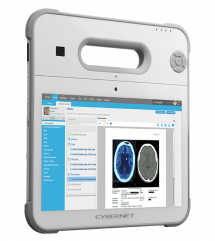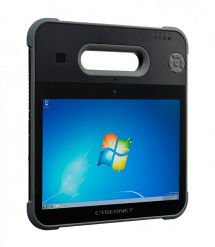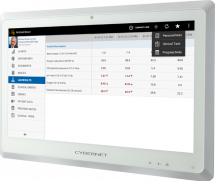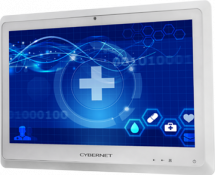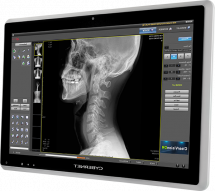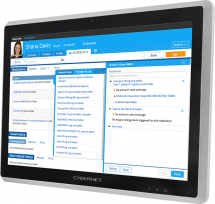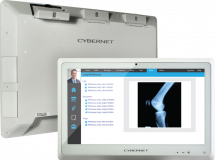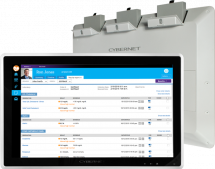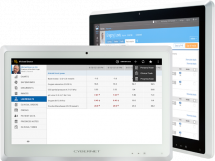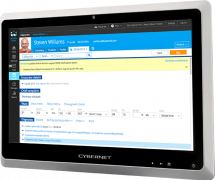Cybernet Medical PCs and Tablets
Cybernet's Medical Grade Computers are designed to meet the specific needs of healthcare.
- Sealed & Waterproof
- IP65 Rated. Protected from water & dust. Allows thorough cleaning of our medical PCs.
- Antimicrobial Housing
- The most effective antimicrobial housing available. Reduces the spread of germs.
- Meets Stringent Safety Standards
- 60601-1 Certified. Protects patients & hospital staff from electrical & radiation hazards.
- Integrated RFID, Biometric & CAC Readers
- Increases the security of medical records without interrupting workflow.
Cybernet is an American based company manufacturing medical and industrial grade computers. DPI Medical is proud to represent Cybernet in New Zealand, bringing to you the very best in Medical Computer Technology.

Irvine, CA 8/31/18 - Cybernet is pleased to announce a major partnership with New Zealand’s DPI Medical. DPI is a leading distributor of medical grade monitors to New Zealand’s District Health Boards (DHBs) and was looking to expand their product offering to include medical grade computers and tablets. After reviewing several manufacturers, DPI reached out to Cybernet and will soon be offering the CyberMed Rx tablet and the CyberMed NB series of medical cart computers, along with other models.
This partnership follows a series of recent deals that Cybernet has struck with national health systems in other countries including the UK and Australia. In fact, it was Cybernet’s recent deal with New South Wales Health in Australia that caught DPI’s interest.
“The report that New South Wales Health was using Cybernet’s products was a big plus for us because New Zealand hospitals tend to follow what Australian hospitals do,” said DPI Medical Director Peter Hart. “So we’re quite excited about Cybernet. They’ve got good products and a good offering.”
New Zealand has 17 DHBs in total, serving a population of roughly 5 million people. There are also 5 private hospitals in New Zealand that DPI works with.
“We’re projecting first-year revenues from the deal in excess of $1 million,” said Ali Bagheri, VP of Global Operations at Cybernet. “That includes a number of our CyberMed RX tablets, as well as the NB series of all-in-one systems.”
Despite the recency of the agreement, DPI has already connected one local DHB with the CyberMed Rx tablet for product testing. Cybernet is anticipating that this will be the first of many such projects to be facilitated by DPI’s team.
WHAT IS A MEDICAL GRADE COMPUTER?
A medical grade computer is a computer designed for hospital and healthcare settings. A medical grade computer has an antimicrobial housing that has been designed, tested and certified for near patient use, and complies with the medical standards and regulations in operational performance, reliability, patient safety, and ergonomic compatibility with medical equipment and EMR software.
Performance and reliability are achieved through the industrial grade components, rugged build that withstands disinfection & cleaning with chemical solutions, water- & dust-proof sealed bezel, a fanless design and passive cooling for sterile environments, advanced connectivity options, embedded readers/scanners (RFID, barcode, biometric, CAC, Smart Card) and an inbuilt backup battery.
Ergonomic compatibility is achieved through legacy ports, VESA mounting holes, advanced customization of hardware and software components, and embedded peripherals.
Safety and regulatory compliance of a medical grade computer are guaranteed by certifications such as ingress protection, electromagnetic compatibility and safety, radiation and electric hazards protection, interference from radio signals, MIL-STD (military standard set by DoD), HIPAA and HITECH data security and others.
WHAT IS THE DIFFERENCE BETWEEN A MEDICAL GRADE COMPUTER & A CONSUMER PC?
The differences between medical grade computers and consumer PCs are in the quality of components, failure rates, performance, regulatory compliance, patient safety, embedded readers/scanners (Barcode, RFID, CAC, Smart Card, biometric), mounting ergonomics, compatibility, and the Total Cost of Ownership.
Medical grade computers are tested and certified to comply with stringent medical regulations for use in near-patient and/or sterile environments, while consumer PCs come with basic certifications only.
Medical PCs have antimicrobial housing and waterproof sealed front bezels that withstand disinfection and cleaning with harsh chemicals (often backed by a fanless design). A consumer PC housing propagates pathogens and cannot be cleaned with liquids; medical disinfecting and cleaning solutions tend to deteriorate a consumer PC's plastic casing.
A medical PC comes with MIL-STD components with higher thermal and performance ratings and is superior to that of a consumer PC because industrial grade components provide operational reliability 24/7 in intense medical environments for up to 5 years with < 2% failure rate, while a consumer PC has a 15-30% failure rate when used in healthcare. The EMI and EMC certifications of a medical grade computer are far better than a consumer grade PC. UL60601 standards as well as CB and IEC certifications are also a part of this superior technology.
The purchase price of a consumer PC is lower than that of a medical grade computer, but its TCO is higher when the lack of compatibility with legacy equipment and mounting options, nosocomial infections, high failure rates, deployment, maintenance, downtime, lifecycle and inbuilt obsolescence costs are taken into account, while the TCO of a medical grade PC is significantly lower.
According to recent findings, more than 60% of doctors and healthcare professionals across U.S. have abandoned the good-old clipboard, and switched to a more modern tool that is portable, durable and way more powerful – the medical tablet.
Adapting a medical grade tablet carries a number of advantages for patients and healthcare professionals alike. The volume of paper work inherent to routine operations carried out in medical settings – be it a public hospital, a private clinic or an emergency relief camp – is simply overwhelming. Migrating to the medical tablet does away with not only the pesky paperwork but also the intricate manual procedures in the workflow, increasing the overall process efficiency manifold.
Deploying tablets also circumvents the utterly burdensome human data entry process, eliminating any and all human-introduced errors that are a commonplace occurrence when importing information from distributed patient care systems. Using the tablets also ensures round-the-clock, on-demand access to patient records including diagnosis details, pathological outcomes, financial summaries, prescription particulars and legal information. The medical tablet is also useful for appointment scheduling encompassing medic visits, sample collection reminders, and checkup arrangements.
What renders a medical grade tablet distinct is the ability to seamlessly carry out patient monitoring and multi-level sensory data acquisition – including input from Bluetooth and Wi-Fi enabled healthcare devices and medical instrumentation systems.
The multimedia capabilities boasted by such tablets allow for seamless text, video, image and speech processing. Additionally, the tablets specialize in unified provision of healthcare information such as critical visuals, disease progression and unusual auditory activity to medical personnel. By the use of third party applications, the same data can be synced across the cloud for advanced analytics and warehousing. The communication capabilities permit the doctors and medical staff to stay up to date with the proceedings at the healthcare facility remotely.
Medical grade tablets, unlike their regular counter-parts, warrant a certain level of security, performance, reliability and most importantly – cleanliness. As per directions from the Centre of Disease Control and Prevention, medical devices in near-patient environment must be readily cleansable to minimize contamination and infection risks. Electronic systems, including tablets, are expected to meet the same sanitization guidelines. The equipment disinfection process is to be carried out using a certified cleansing solution, making contact of the electronic device with the liquid inevitable. A tablet used in medical setting thus needs to be fortified with liquid resistant capabilities to ensure the removal of blood, body fluids, microbial organisms, routine dust and dirt.
The need for mobility associated with routine operation of any equipment healthcare setting imposes yet another crucial design requirement – portability and superior ergonomics. A functional portable computing unit is expected to be light weight so that it is carried around by the medics throughout the day (and night) with little muscular strain. The tablet is also designed to withstand ingress by liquid and dust particles.
Cybernet's medical tablet product line-up conforms to the EN60601-1 standard, the internationally accredited certification for electronic medical equipment. The product-mix also boasts an IP-65 front bezel and an IPX1 back cover. Cybernet's medical grade tablets are fortified with antimicrobial coating on top of a rigid aluminum housing. The unique fanless design reduces not only the electrical and audible noise but minimizes dispersal of unsterile matter to a considerable extent as well. High-performance batteries on-board the medical tablets ensure uninterrupted operations extended over longer period of time. State-of-the-art ergonomics and cutting-edge processing prowess are the core factors that differentiate Cybernet from the competitors.
DPI Medical is seriously committed to giving our clients a seamless and straight-forward experience with your medical PCs, screens and tablets.
We hold support units in Wellington. Should there be any issues, we will immediately ship a support loan unit overnight, so that our clients can continue without interruption while the original unit is being assessed and repaired. There is no charge for this service within the warranty period, and can be added as an on-going lifetime option.
